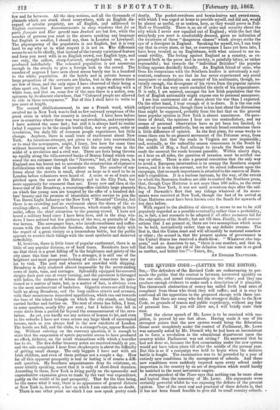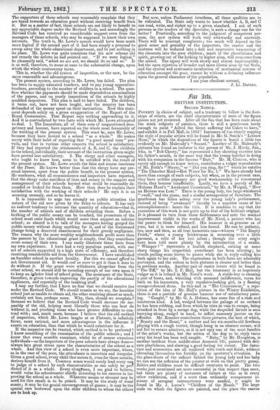THE ItEVISED CODE :—(LETTEll. TO THE EDITOR).
SIR,—The defenders of the Revised Code are endeavouring to per, suade the publie that the contest is between interested eppidity on the one side, and sound statesmanship on the other; and they can produce enough evidence to make such a description of it plausible. The threatened abstraction of money has called forth loud cries of complaint from those who think they will suffer; and it is easy to confound all the opposition to the proposed change with these out- cries. But there are many who feel the strongest dislike to the New Code, on grounds of reason and public expediency, without any fear of personal loss. If you will allow me, I will briefly state their case.
That the clever speech of Mr. Lowe is to be received with sus- picion, is proved by one fact alone. Having made it one of his strongest points that the new system would bring the Education Grant more completely under the control of Parliament, Mr. Lowe was naturally asked by Mr. Disraeli why he had been so inconsistent as to force a revolution in the educational department upon the country whilst Parliament was not sitting ? He answered that he had not done so, because the first examination under the new system would not have taken place till after the middle of the present year. But this is as if a campaign was held to begin when the decisive battle is fought. The examination was to be preceded by a year of entirely new conditions in the management of schools. And these new conditions were suddenly imposed upon every school under inspection in the country by an act of despotism which could hardly be matched in the most autocratic empire. A correspondent of the Times says that nothing can be more close and logical than the reasoning of Mr. Lowe. His arguments were certainly powerful whilst he was exposing the defects of the present system. One of the most real and practical of these defects is, that it has not been found feasible to give aid to small country schools. •
The supporters of these schools may reasonably complain that they are taxed towards an education grant without receiving benefit from it. But as a matter of fact, these schools are not likely to benefit to any appreciable degree under the Revised Code, and accordingly the Revised Code has received no considerable support even from the managers of those schools, who may be supposed to know their own interests. The truth is, Mr. Lowe's speech would have been much more logical if the second part of it had been simply a proposal to sweep away the whole educational department, and to put nothing in its place. Mr. Lowe was quite con:scions that his new scheme did not remedy the defects he had pointed out. "If we were logical," he pleasantly said, "which we are not, we should do so and so." It is as well, therefore, to come at once to the substantial change, upon which the whole controversy turns.
This is, whether the old system of inspection, or the new, be the more reasonable and advantageous.
The present system, according to Mr. Lowe, has failed. The plan has been to supply educated teachers, and to pay young apprentice. teachers, according to the number of children in a school. Ile ques- tion whether the payments should be made depended on examinations of the payees, and on yearly inspections of the schools by highly qualified inspectors. This plan is said to have failed. The children, it turns out, have not been taught, and the country has been defrauded of the money spent on their instruction. Now this state- ment depends solely on a gross exaggeration of the Report of the ' Royal Commission. That Report says nothing approaching to it. And it is contradicted by two facts with which -Mr. Lowe attempted to deal. 1. The Inspectors, all of them men of unquestioned com- petency and honour, have reported on the whole most favourably of the working of the present system. This must be, says Mr. Lowe, because they have looked to a school "as a whole." He makes merry with their habit. of reporting that "a good moral tone" pre- vails, and that in various other respects the school is satisfactory. If they had reported the attainments of A, B, and C, the children in the school, individually, their account of the instruction given might have proved less satisfactory. 2. The clergy and other managers, who ought to know best, seem to be satisfied with the result of the present system. Mr. Lowe avoids the false and coarse insolence of the Times. He knows better than that the clergy have any per- sonal interest, apart from the public benefit, in the present system. He confesses, what all commissioners and inspectors have reported, that the clergy make sacrifices of time and money in the support and management of their schools beyond what could be reasonably de- manded or looked for from them. How then does he explain their satisfaction with the working of their schools ? He says it is an amusing anomaly, and so he leaves it.
It is impossible to urge too strongly on public attention the nature of the aid now given by the State to schools. It has only an indirect tendency to increase the quantity of education—that is, the number of schools and of children attending them. Before a farthing of the public money can be touched, the promoters of the school must raise funds which would more than support an inferior school; so absurd is it to talk of the managers having gorged the public money without doing anything for it, and of the threatened change being a deserved chastisement for their greedy negligence. The reason why the more wealthy neighbourhoods profit more than the poorest by the educational grant is simply, that they contribute more money of their own. I can easily illustrate these facts from my own experience. I have had a very populous parish, with one set of schools supported in a high state of efficiency, and therefore . receiving considerable aid from the Government. I have established an humbler school in another locality. For this we cannot aford to ask Government aid. It would cost us more to get it than it does to do without it. If the grant were withdrawn altogether from the other school, we should still be spending enough of our own upon it to keep an kiferior kind of school. going. The assistance of the State, therefore, is given towards improving the quality of the educational
appliances, and especially of the teaching staff. e
I may say further, that I have no fear that we should receive less under the Revised Code. We should remain as we are, the humbler school just as unable to obtain aid, the other receiving almost as much, certainly not less, perhaps more. Why, then, should we complain? Because we believe that the Revised Code would increase the ine- quality of the old, helping most liberally those who can best do without it, and pinching those who have greater difficulties to con- tend with ; and, much more, because I believe that the old method of inspection, which Mr. Lowe laughs at as Platonic, is infinitely fairer, more rational, and more advantageous in the influence it exerts on education, than that which he would substitute for it.
If the inspector can be trusted, which method is to be preferred ? I know something of the examination of the public schools ; and I know that every sensible examiner, whilst he of course examines individuals—as the inspectors of the poor schools have always done— always lays great stress upon the characteristics of the school as a whofe. And this view of a school is even more important, where, as in the case of the poor, the attendance is uncertain and irregular. Given a good school, every child that enters it, even for three months, derives benefit from it. Common sense would surely lead every on to judge of a school by such characteristics as can safely be pre dieted of it as a whole. Every clergyman, I am glad to believe, would value his schoolmaster chiefly according to his success in im-
proving the school as a whole. Whatever means or element may be used for this result is to be prized. It may be the study of vocal music; it may be the genial encouragement of games ; it may be the special care bestowed- upon the elder children to whom the others are to look up. But now, unless Parliament interferes, all these qualities are to be ridiculed. The State only wants to know whether A, B, and C can read, write, and cipher up to a given standard. I ask of such persons as the readers of the Spectator, is such a chn ge one for the better?. Practically, according to the judgment of competent per- sons, the new system will work very awkwardly and unevenly. There will be constant complaints ; too much will depend on the good sense and geniality of the inspectors, the master and the mistress will be -teduced into a dull and oppressive hammering of the elements into the poor children; much of the cheerfulness and spirit, growin„a out of the looking to higher aims, will evaporate from the school. The injury will work slowly and almost imperceptibly ; but the open rejection of broader and more liberal aims by the State, and the cynical and systematic inculcation of mechanical notions of education amongst the poor, cannot be without a debasing influence upon the general character of the population.
I am your obedient servant, J. Ll. Davos.































 Previous page
Previous page